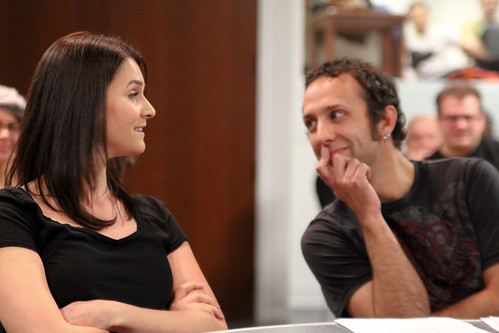It was a small moment at the WordPress DC Meetup. One of the creators of WordPress, Matt Mullenweg, was in town. He had come to this monthly meeting at Fathom Creative to learn what the local community wanted in the next version of his web publishing software.
The media library in WordPress was discussed. Mullenweg admitted that it is confusing and gets difficult to manage once you have lots of images in the library. A man in the audience brought up a technical issue he had with the library. Mullenweg explained that you could actually do what the man wanted to in WordPress but stated:
The software is wrong, not the people.
This is a revolutionary statement. Mullenweg could have just told the man that “you’re doing it wrong” before telling him the “right” way to work with WordPress. Instead, the fact that users had problems with the media library told him that the software needed to be improved.
It’s a contrary notion. We all adapt to clunky and ever-changing software, relearning the basic tasks needed to accomplish our work – where’d they move the print button?
And we cope with this increasing complexity without complaint. Because no one wants to look stupid. You can’t figure out the ribbon in Microsoft Word? You must be the idiot, not the software.
This is especially true in the world of content management systems for web sites. I’ve worked on large-scale web sites for more than a dozen years as a web editor, producer and site manager. I remember when we did things in HTML. I have fond memories for Claris HomePage. Compared to the complexity of managing a large site in Dreamweaver, a CMS seemed like a brilliant idea.
Be careful what you wish for. Over time, I’ve had the fortune/misfortune to use nearly every major CMS out there.
The simple publishing tools that we used back in the 90s “evolved” into massively complex structures requiring expensive experts to install and administer. CMS like SharePoint, Vignette and Percussion are punishing experiences for the user, turning the joyous task of writing into a machine-led death march. You enter your content and then engage in a series of database programming tasks, with the hope that at the end of it, if everything goes well, your article will appear in the correct format on the web site at the next publishing cycle.
It’s no wonder that there’s so much bad writing online when the publishing tools are so lousy.
WordPress is different. Being open-source, and closely tied to the community (would Steve Ballmer listen to your feedback?), it has a different philosophy – “The software is wrong, not the people.”
Of course, it’s not perfect – the media library definitely needs some work – but it’s easy to use and adaptable. WordPress now powers more than 50 million web sites.
And, most importantly of all, it’s software that people want to use. No one feels passionate about SharePoint. But they do about WordPress. This enthusiasm will lead to its greater adoption. Over time, the users will prevail.
 Staged reading of Interview Date, with writer/producer Grant Lyon on right.
Staged reading of Interview Date, with writer/producer Grant Lyon on right. 

